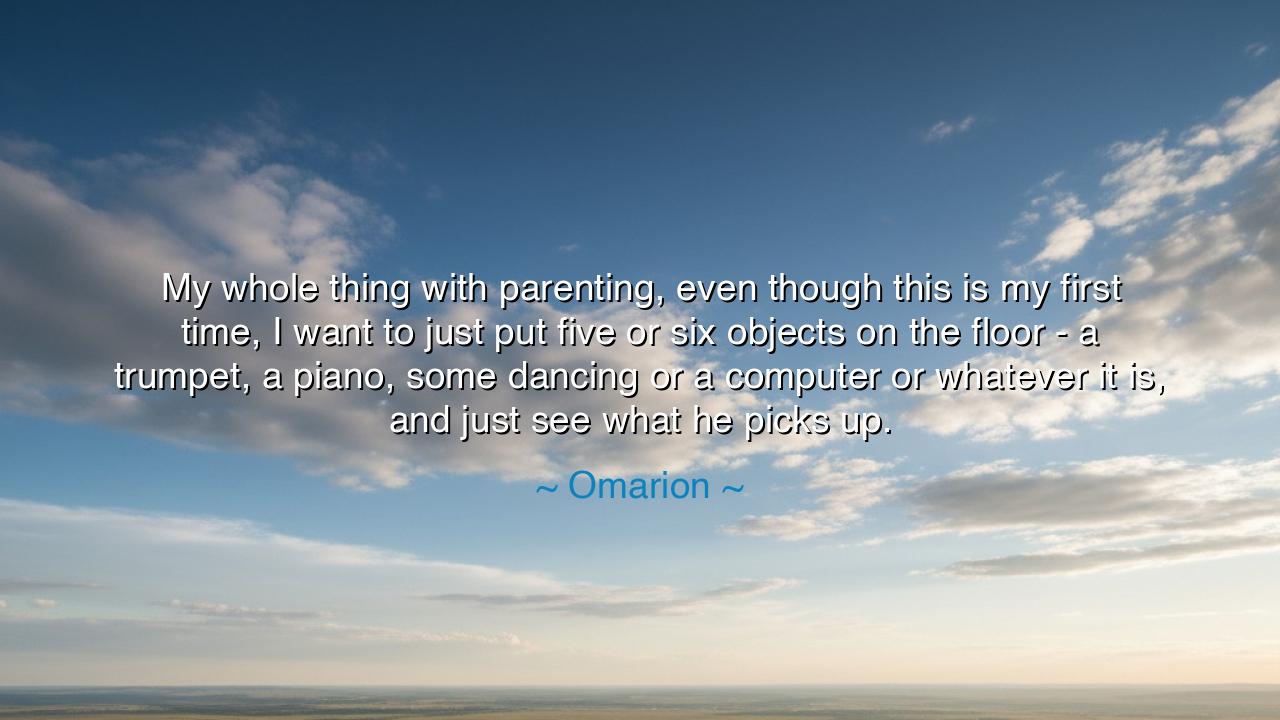
My whole thing with parenting, even though this is my first
My whole thing with parenting, even though this is my first time, I want to just put five or six objects on the floor - a trumpet, a piano, some dancing or a computer or whatever it is, and just see what he picks up.






Omarion, artist and father, once spoke with the simplicity of love and the wisdom of openness: “My whole thing with parenting, even though this is my first time, I want to just put five or six objects on the floor—a trumpet, a piano, some dancing or a computer or whatever it is, and just see what he picks up.” In these words is hidden a philosophy as old as time, yet expressed with the freshness of a new parent’s wonder. He reveals that the heart of parenting is not the molding of a child into one’s own likeness, but the creation of space in which the child may discover who they are meant to be.
The origin of this thought lies in Omarion’s own journey as both a musician and an individual shaped by choice. Having found his own path in art, he recognized that greatness cannot be forced, but must arise from within. By placing objects before his child, he speaks of offering possibilities without imposing destiny. The trumpet, piano, dance, or computer are more than tools—they are symbols of pathways, invitations to explore the boundless terrain of human potential. His vision is that of a gardener, not a sculptor: to provide soil, water, and light, and then to let the flower reveal its own shape.
History gives us countless examples of parents and mentors who understood this truth. Consider Leopold Mozart, who placed a keyboard before his young son Wolfgang. The child chose it, touched it, and in touching, began the path to genius. Or think of Benjamin Franklin, whose father exposed him to many trades—candlemaking, printing, and writing—and in the freedom to explore, he discovered his calling as a writer and statesman. In each case, the greatness of the child was not forced, but discovered through opportunity. Omarion’s vision echoes these timeless lessons: give choices, and let the child’s spirit decide.
His words also carry a quiet humility. Parenting, especially for the first time, can be filled with fear—the fear of doing wrong, the fear of not guiding enough. Yet Omarion reminds us that guidance is not control. The role of the parent is not to dictate, but to invite. The objects on the floor symbolize trust: trust that the child’s soul already carries within it the seeds of purpose, and that the parent’s role is simply to help those seeds find their ground. This humility is itself a kind of wisdom, born not of certainty but of love.
At the same time, his words stand against the temptation of parents to live through their children. Too often, fathers and mothers demand that their sons or daughters fulfill their own unfulfilled dreams. They hand them the trumpet and command, “Play.” They place the computer in their hands and say, “Succeed.” But Omarion offers another way: he lays the objects down without demand, without command, and waits to see what the child will choose. This is not weakness—it is strength, for it is the courage to let the child’s will be sovereign.
The lesson here is profound: the highest duty of the parent is not to create a copy of themselves, but to create an environment where the child may discover their own destiny. Provide opportunities. Expose them to many paths. Give them the chance to hear the sound of music, to feel the rhythm of dance, to marvel at the glow of the screen, to taste the sweetness of learning. But then step back, and honor their choice. For in their choice lies their truth, and in their truth lies their greatness.
Therefore, let this wisdom be carried forward: lay the objects of life before your children—tools, arts, books, instruments, ideas—and watch with patience to see what they reach for. When they choose, honor that choice, nurture it, and let it grow. For the future belongs not to those who were forced into molds, but to those who were allowed to discover themselves. And so Omarion, in his first steps as a father, has touched upon an eternal teaching: that love gives freedom, and freedom gives rise to destiny.






AAdministratorAdministrator
Welcome, honored guests. Please leave a comment, we will respond soon